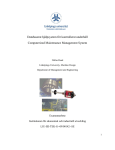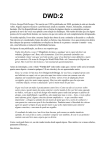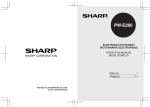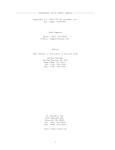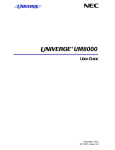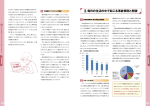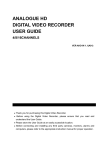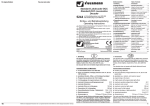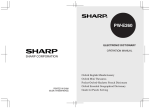Download The EuroAsiaSpeller version 6.2.3.7/W (RC1) UNICODE User manual
Transcript
The EuroAsiaSpeller version 6.2.3.7/W (RC1) UNICODE User manual – *TALO b.v., Lijsterlaan 379, 1403 AZ Bussum, NL. Spelling of lexical and grammatical collocations Enlarged edition Completely revised Publ. Date: 02-05-2015 –’s Language Technology *TALO May 2015 – Copyright © *TALO b.v., 2001, ....... ,2015 All rights reserved. Without limiting the rights under copyright reserved above, no part of this production may be reproduced, stored in or introduced into a retrieval system or transmitted, in any form or by any means (electronic, mechanical, photocopying, recording or otherwise), without the prior written permission of both the copyright owner and the above publisher of this book The greatest care has been taken in compiling this book. However, no responsibility can be accepted by the publisher or author for the accuracy of the information presented. 2 –’s Language Technology *TALO Publ. Date: 02-05-2015 1. INTRODUCTION The EuroAsiaSpeller adds spelling capabilities to text editors for the European, Asian, African, North American languages. The EuroAsiaSpeller is a single library speller system supporting nearly any European languages and beyond. The EuroAsiaSpeller presents new standardized method to implement spelling. The EuroAsiaSpeller adds control of punctuation. The EuroAsiaSpeller adds control of lexical and grammatical collocations. The EuroAsiaSpeller comes with one text tool: EUSpell (an ascii text editor). The EuroAsiaSpeller adds correction of expressions enabling, and support many languages using complex scripts such as Hindi, Marathi, Nepalese, Sinhala. your own bespoken style guide. The EuroAsiaSpeller DLL/Shared Library can also be attached to other publishing systems. In order to be successful you will need the Shared Library’s technical documentation "talo_s_lib6236.pdf" (information: [email protected]) and the library. An introduction can be found in the directory "EuroAsiaSpeller/euspell/ doc/technotes". 1.1. Distribution The version 6.2.3 of the EuroAsiaSpeller is distributed for OEM-clients on a CD- or DVD-medium or is available from Internet ("http://www.talo.nl/" download menu). • The CD combines all lexicons on a single medium. • The Internet extracts of the CD are divided into multiple zip-files: the main utility euspell_main_6.2.3.zip and several sets of dictionaries, e.g., euspell_lex_uk-am-ca_6.2.3.zip or euspell_lex_de_6.2.3.zip, the English and German lexicons. To install from Internet at least two modules should be downloaded and unpacked (the unpack path has to be the same). 3 Publ. Date: 02-05-2015 –’s Language Technology *TALO 1.2. Try before you buy! You can try the Internet extracts before buying, for a period of one month per language module! You cannot install a language for a second time. Please inquire about any information how to order the TALO’s spell checker at e-mail: [email protected]. If you do not buy a license, you have to erase (or uninstall) the program and accompanying files on all storage media. 2. Key features • • • • • • • • • • • • • • • 4 Spelling reforms, automatic respelling Accurate suggestions Add your own alternatives to user mistakes instead of ours Separate Dialogues for Alternatives and Loop Up for Words Fast access to any dictionary entry independent of the size Renew integrated punctuation checks during spelling Integrated checks for lexical and grammatical collocations during spelling which can serve as a newspaper’s Style Guide Learning from history, automatic correction Tunable Accuracy, text and OCR modes Three button Concept for a comprehensible set of spelling functions UNICODE (UTF-16 and UTF-8) for Windows XP, Vista, Windows 7 & 8 DialogLess Shared Libraries for Linux x86 and Linux x64 available Sorting Order either alphabetical or based on similarity Apply User Actions Session Only or Add Change Warning to User Actions at time of Spell Checking A Stop Words list to skip unsuitable suggestions in spell check dialogs –’s Language Technology *TALO Publ. Date: 02-05-2015 3. INSTALLATION This installation program is automatically executed when you put the CD in the CD-drive or when the CD is entered in the CD drive. Alternatively the user can execute the [CD]:setup.exe or setup_x64 program, which executes the installation program [CD]:\euspell\bin32\installs.exe (Note, this complete path has always to be used). The install procedure invites you to supply a general license key and a license key per language (group) to be specified during installation of the dictionaries. For Windows 32 bits versions "setup.exe" should be used and NOT "setup_x64.exe". "Setup_x64.exe" is meant for 64 bit versions of Windows ONLY. For Windows Vista, Windows 7 and Windows 8 the setup program should be "run as administrator", however in most cases the setup utility will probably be run as administrator by default. If not choose the above option yourself. In addition you should allow the Setup Utility to run! For a demo installation the general license key should be set to zero or better the area of license key should left blank. For all other cases key codes are required. The Internet extracts use a virtual CD, a path name which replaces the CD. This path name is c:\EuroAsiaSpeller by default. The path name is automatically altered during the installation and only a few clicks on <Next>, <Yes> or <OK> buttons are required. The the EuroAsiaSpeller SetUp procedure starts with a welcome screen, as presented in fig. 1. By clicking on Next the program continues, by clicking on Exit the program will close. By clicking on Next the license agreement is shown, which can be accepted (Yes) or rejected (No). If you don’t accept the license agreement click on <No>. SetUp will close. If you accept the license agreement click on <Yes>. SetUp will continue. If you have accepted the license agreement SetUp continues and the user is guided though the installation procedure by a few of steps that acquire simple actions. During the SetUp an explicative message log is written to the background screen. PLEASE, READ THE TEXT on the background log screen. You can move the windows in top. The first step is to supply the speller with basic information (see fig. 3). If you install the "EuroAsiaSpeller", please, type your authorization number (General Access Key) and the other registration variables in the edit fields of the EuroAsiaSpeller Authorization dialogue. The authorization number consists of a series of numbers separated by a hyphen. For the option "try before you buy" or if you don’t have an authorization 5 Publ. Date: 02-05-2015 –’s Language Technology *TALO Fig. 1: The welcome screen of the EuroAsiaSpeller SetUp. For continue click <Next>, for close click <Exit>. number yet and are testing the EuroAsiaSpeller you should leave the Authorization field blank. Type your Authorization number: xxxx-xxxx-xxxx Type your name for registering: my_name Type your company name: my_company_name and press <Continue> If you want to uninstall the EuroAsiaSpeller, please, press the <Uninstall> Button and follow the instructions. After having pressed <Next> the installation continues with the SetUp parameters. The "EuroAsiaSpeller Set Up Parameters" dialogue box appears above the background log screen. By default the CD-station and four directories are displayed in the Set Up Dialogue: 6 –’s Language Technology *TALO Publ. Date: 02-05-2015 Fig. 2: The license agreement text, which has to be accepted to continue. Windows XP d: c:\Program Files\euspell\bin32 (program directory) c:\Program Files\euspell\spell (lexicon directory) c:\Program Files\euspell\spell (server directory) c:\Program Files\euspell\spell (user history or personal directory) c:\tmp Windows Vista, Windows 7 and Windows 8 d: c:\Users\Public\Program Files\euspell\bin32 (program directory) c:\Users\Public\Program Files\euspell\spell (lexicon directory) c:\Users\Public\Program Files\euspell\spell (server directory) c:\Users\Public\Program Files\euspell\spell (user history or personal directory) c:\tmp It is save to accept the default directories, but for your convenience you can browse for another CD-station or for other directory names, or you can just enter another directory name. • If you install from an Internet zip-file, a virtual CD will be created during un- 7 Publ. Date: 02-05-2015 –’s Language Technology *TALO Fig. 3: The Authorization variables If you don’t have an authorization number leave the authorization field of Dialogue empty! If you want to remove a previous installation of the EuroAsiaSpeller click on Uninstall. If an authorization key was supplied, it should specified in the authorization field before clicking Uninstall. packing. The default path for this virtual CD is c:\EuroAsiaSpeller. This path is automatically recognized. • The Program Directory "c:\Users\Public\Program Files\euspell\bin32" is the folder for executables: the EuroAsiaSpeller and the files needed to run the program. • The Lexicon directory "c:\Users\Public\Program Files\euspell\spell" is the folder for all dictionaries • The History Directory "c:\Users\Public\Program Files\euspell\spell" is the folder for the user history. You can also choose the current directory ".\". It is also possible to use a profile: "%USERPROFILE%\history". In this case the directory "history" is created in your personal folder which becomes: c:\Users\MyName\history If another user is also installing the speller his personal history will separated from your’s. • c:\tmp is a directory for temporal usage, probably already existing. 8 –’s Language Technology *TALO Publ. Date: 02-05-2015 Fig. 4: The SetUp variables The above figure has a CD station on D: and has selected the default directories on drive C: to install programs and lexicons. If you like to browse to a different directory click on Browse. For a first installation select a program language (NL = Dutch, UK = English, D = German, F = French and SE is Swedish. Thereafter choose "Next load applications too". For loading dictionaries only choose "Next load dictionaries only" The loading of dictionaries is explained in fig. 9. Note: you cannot assign the CD spell directory to the programs lexicon directory. So [CD]:\euspell\spell is invalid. Subsequently, you can chose a program language version of the EuroAsiaSpeller: the Dutch (NL), English (UK), German (DE), French (F), or Swedish (SE) version. Thereafter you choose between "Next load applications too" (load executable programs) or "Next dictionaries only" to install new dictionaries. If you have chosen for the installation of "Next load applications too", an optional group with shortcuts is created in either the "Start Menu" or its submenu "Programs". You can cancel this option if necessary. You have to select OK to create a link for each application in the Euro Speller group either in Start or Programs Menu: 9 Publ. Date: 02-05-2015 –’s Language Technology *TALO Fig. 6: Browsing for a directory EuSpell, a text only version (reads text files) that is capable of handling Western and Central European, Baltic, Cyrillic, and Greek scripts, and complex scripts (Arabic, Hebrew, Hindi, etc.). The menu "Install Dictionary" will be highlighted and should be used to select a target language. You now install the dictionaries one by one (see fig. 9 and 10). If you have a language license key you should enter this key in the edit field of the Change CD dialogue of fig. 10. This dialogue specifies the requested language and an edit field for the language key authorization number. Note this is not the general authorization number of fig. 3. The keys can be found in the accompanying form ACCESS KEYS FOR THE EUROASIASPELLER. If you don’t have an authorization key a dialogue without an authorization field will be displayed. In order to install the dictionary you have to click on OK, otherwise click on CANCEL. A correctly installed dictionary will be flagged in the menu giving you an overview of the dictionaries installed. If you try to re-install a demo dictionary the flag will be removed. You can re-install it by going back to the authorization dialogue and inserted a valid general authorization number. Re-installing the language will ask for the language authorization number. If a dictionary is not distributed on the current CD or in the extract of a zip-file the dictionary name is 10 –’s Language Technology *TALO Publ. Date: 02-05-2015 Fig. 7: The Start up menu, where to insert a start menu item. A group EuroAsiaSpeller will be inserted. Thereafter, the Desktop links (icons) will be inserted. Fig. 8: The Message notifying the installation of the dictionaries. grayed. 11 Publ. Date: 02-05-2015 –’s Language Technology *TALO Fig. 9: If all dialogues are setup a language/dictionary can be select to be installed. The languages/dictionaries are grouped by the language family, that is Germanic languages, the Roman languages, etc. For the Slavic languages a latin-2 and a Cyrillic group exist. After the installation of one language a next one can be chosen. If ready you can Exit or go back to the Setting dialogue. 4. HOW TO FINISH THE INSTALLATION After having installed all dictionaries, the installation should be finished by selecting FUNCTION | EXIT. The final dialogue "Up-date or Create Settings" appears. For the very first time you should always click on Yes to accept the current settings which you have chosen beforehand. If not initialized: the EuroAsi- 12 –’s Language Technology *TALO Publ. Date: 02-05-2015 Fig. 10: Accept a demo Dictionary or Enter the language key code. If you are just trying the EuroAsiaSpeller for this language leave this field blank. If you didn’t previously entered a general authorization number a dialogue without a number field is presented. aSpeller will not run. If approved the installation procedure optionally adds the directory "c:\Program Files\euspell\bin32" to your search path in your "autoexec.bat" file (see the command PATH). If this file does not exist it will be created. For Windows Vista, Windows 7, and Windows 8 the "autoexec.bat" option does not apply. 4.1. Usage After completing the installation you can use EuroAsiaSpeller. The text version of the EuroAsiaSpeller is named "EUSpell.exe". The EuroAsiaSpeller reads UTF-8, UTF-16 and multiple Windows ascii files using codepages (WCP-1252, 1250, 1257, etc.). The file type to be saved can be chosen. For the CodePage type the spelling language determines the codepage. (see the section "The EuroAsiaSpeller functions" pg. 15). Most text processing 13 Publ. Date: 02-05-2015 –’s Language Technology *TALO Fig. 11: Finishing the installation For the very first time you have to click on <Yes>. If the installer detects a new version of the library and executables you have to update the settings too. If you install new or updated dictionaries only this dialog is not shown. packages can store and read their documents as Rich Text Format documents. For Linux a wxWidgets richtext utility is available. Both versions of the EuroAsiaSpeller can be started from the command line, or from the Start Menu. For command line execution you use: >euspell my_file.txt You can also open files with the file open dialogue. If you try to switch between languages an error message might be presented. Please, return to the Dutch (GB) language or one of the languages you have installed. Such a message can also occur when you use the speller for the first time. Please, select the Dutch (GB) language or one of the languages you have installed from the Settings Dialogue (evoked by the first button). The EuroAsiaSpeller is easy to use. Its functionality is close to Microsoft’s NotePad or WordPad, except for the additional spelling functions, the three buttons or menu items: settings, spelling and lexicon view. 14 –’s Language Technology *TALO Publ. Date: 02-05-2015 4.2. Fonts For most languages codepages are present in the default fonts such as Times New Roman and Arial. For Arabic, Hebrew and the languages of India Complex Scripts have to be enabled (Control Panel | Regional and Language Options). 4.3. Limits The speller can only be used on Operating Systems which support Unicode (Windows XP, Windows Vista). The EuroAsiaSpeller search function supports the use of the native language’s citation marks. 5. Languages available on the CD Afrikaans Bahasa Indonesia Bahasa Melayu Basque Bulgarian Byelorussian Catalan Croatian Czech Danish (rettskrivning 2012) Dutch (2005 (NGB)) Dutch (New Spelling (GB)) Dutch (New Spelling (VD)) Dutch: Flemish (2005(NGB)) Dutch: Flemish (New Spelling (VL/GB)) Dutch: Flemish (New Spelling (VL/VD)) Dutch: Suriname English: Australian English: Canadian English: Irish Gaelic English: New Zealandic English: South Africa English: UK 15 Publ. Date: 02-05-2015 English: USA English: Welsh Estonian Finnish French French (New Spelling) French: Belgian French: Belgian (New Spelling) French: Canadian French: Canadian (New Spelling) Frisian Friulian (Italy) Galician German: Austrian DPA German: Austrian Reformed 1996 German: Austrian Reformed 2006 German: Austrian Traditional German: DPA German: Reformed 1996 German: Reformed 2006 German: Traditional German: Swiss DPA German: Swiss Reformed 1996 German: Swiss Reformed 2006 German: Swiss Traditional Greek Greenlandic Hungarian Icelandic Italian Latvian Lëtzebuergesch (Luxembourg) Lithuanian Macedonian Maltese Maori Norwegian: Bokmal Norwegian: Nynorsk Polish Portuguese (+Acordo Ortográfico) 16 –’s Language Technology *TALO –’s Language Technology *TALO Publ. Date: 02-05-2015 Portuguese: Brazilian (+Acordo Ortográfico) Romanian Russian Saami Serbian Setswana Slovak Slovenian Spanish Spanish: Castilian Spanish: Argentine Spanish: Mexican Spanish: Latin Am. Swahili Swedish Tagalog Turkish Ukrainian Vietnamese Xhosa Zulu Setswana Sesotho Arabic Hebrew Persian/Farsi Urdu Azerbaijanian (Azari) Kurdish (Northern) Hindi Marathi Nepalese Malayalam Bengali Gujarati Tamil Punjabi Sinhala (Sri Lanka) (see also fig. 9, see also "http://www.talo.nl/"). (the status of the languages is available from: "http://www.talo.nl/") 17 Publ. Date: 02-05-2015 –’s Language Technology *TALO An authorized version of the EuroAsiaSpeller will be supplied on a CD and can – be ordered from *TALO ’s address. This CD will include the package of languages ordered with the EuroAsiaSpeller. Recent information about other languages can be obtained from http://www.talo.nl/" download menu. 18 –’s Language Technology *TALO Publ. Date: 02-05-2015 6. The EuroAsiaSpeller functions The EuroAsiaSpeller has been installed and one or more lexicons are ready to be used. For some languages an additional true-type font have to be installed. Free fonts from the Internet can be found on the CD. Please, use the Control Panel Item Fonts to install additional fonts. The main spelling function consists of the three dialogues presented in fig. 12 and 13. Fig. 12: The EuroAsiaSpeller functions (text version) with the dialogs Select settings, Speller alternatives and Lexicon view opened The functionality of the dialogues is identical for EUSpell and any other application using the EuroAsiaSpeller design. Each of these dialogues is evoked by a button press at the left side of the main window or by selecting a menu item under Euro Spell. For EUSpell from top to bottom: the settings dialogue, the alternative dialogue and the lexicon view dialogue. The Settings Dialogue can also be evoked with the function key F10, the alternative dialogue with F11 and the lexicon view dia- 19 Publ. Date: 02-05-2015 –’s Language Technology *TALO logue with F12. The dialogues can be opened concurrently. Moreover manual editing during spelling is allowed. The functionality of the three buttons can also be evoked from the menu item "Euro Spell". One or more files are opened with "File | Open". A fourth button at the left of the main window becomes significant when multiple files are selected. This button is used to spell the next file and will display the word "next" as long as there are files to spell. The use of the three buttons "Settings", "Alternatives" and "Lexicon view" are specified below: 6.1. Settings Text • Digits/Text ✓ • OCR The user can set the type of text to be spelt to "text" only, "digits/text" or "OCR". Additionally abbreviations and punctuation control can be enabled. Enable abbreviations ✓ Each abbreviation can be checked for a match with the abbreviation list. Abbreviations should be enabled when the punctuation mechanism checks capitalization after full stops (periods). Double word check ✓ Internet Address check ✓ Checked to History Checked from History Yes Auto ✓ No Respell only For control purposes the user can enable warning history messages. Items can be send to the history or/and corrections can be executed from the history data base. Messages to the history concern a check whether the user is certain to include an item in the history. Messages from concern the conditions of using an item for correction of the text. The user can have full control over these manipulations. For "Checked from History" the correction the user can choose between: "Yes", full warning, all history items will get a message box [Y/N], "Auto", only warnings for the latest respelling pairs and those which have 20 –’s Language Technology *TALO Publ. Date: 02-05-2015 Fig. 13: The History menu functions: always [Y/N] query, automatic learning of the history and default no query (automatic correction). not been used frequently will evoke a message box (the server history is considered to be certain to be used automatically), "No", no warnings at all, except for those history items which have got a warning mark. The "Respell only" item only uses re-spelling pairs from the server, style and user history. Normal spelling is omitted. This mode can be used for text modifications between British and American English orthographies. Check punctuation on ✓ Automatic punctuation replacement Punctuation style For control purposes the speller can send warning punctuation messages to the regular alternative box, for punctuation errors a single correct pattern is dis- 21 Publ. Date: 02-05-2015 –’s Language Technology *TALO Fig. 14: The 11 different citation styles used during punctuation checks. played only. This pattern can be accepted or the user can change the punctuation pattern manually. For English the punctuation marks “...” are used (style 1), for Dutch „...” (style 3) and for German „...“ (style 4). The default punctuations of a language are chosen with style 0 (see fig. 14). For the Scandinavian countries the proper guillemet characters are applied. These guillemets differ per Nordic country. Type writer quotation marks are converted to graphical marks. Greek, Hebrew, and Arabic should use the default style (0) only. The patterns which belong to the punctuation marks can be modified by editing the "xxx-xxx-xxx.punc" files in the spell directory (c:\euspell\spell) (xxx-xxx-xxx should be exchanged by the current language name, see the list of language names). The ansi text editor EUspell can control punctuation which runs over to the next line. Here, a paragraph boundary in the form of a carriage return is assumed to be present. However, many texts use carriage returns to close each line of the text and there is no intention to associate returns with a paragraph boundary. To prevent the paragraph assumption the Euro Spell menu’s item 22 –’s Language Technology *TALO Publ. Date: 02-05-2015 "Paragraph mode" should disabled. The punctuation control principle also checks for missing capital characters at the start of sentences, this form of checking occurs after a dot, question mark or an exclamation. For this type of correction the control of abbreviations should be enabled and private abbreviations should be added to abbreviation list (for English the file eng-gbr-std.abbr in the spell directory; the spell directory was entered in fig. 3). MicroSoft’s functionality often exchange single and double quotes into there ascii equivalents " or ’. The punctuation mechanism can exchange the type writer quotation marks into graphical quotations. The later ones will be printed and are written to file, but keep the above in mind! EUspell keeps any single and double quote "as they are". The preset punctuation style is defined in the punctuation data base. However, the national language style can be changed in another style using different kind of quotes (see also the Appendices B and C). Expressions or collocations The expression function enables spelling of multiple words, usually named collocations. Examples are Geographical Names (Black Sea, Snake River), lexical or grammatical collocation (a house, a union, not, an house, a union). Expressions or collocations have to be defined in advance. For English, Dutch, French and German a broad set of expressions has been included. The user can add his own expressions to the personal or user history file (see also Appendix D). Paragraph mode [on/off] (main Menu | Euro Spell) The "Paragraph mode" state in EUSpell’s main speller menu can be set to enable punctuation checks at the end of each text line, and/or multiple word spelling (grammatical and lexical collocations and expressions. Each return is considered as the end of a paragraph and therefore the next paragraph should start with a capital character. This check is disabled when "Paragraph mode" is switch off. Word length not checked The user can set the word length to be disregarded. Sorting Order The user can switch between an alphabetic sorting order or an sorting order based on similarity. Similarity is relative to an user made mistake and most similar item is put in top of the list. 23 Publ. Date: 02-05-2015 –’s Language Technology *TALO 6.2. Language The language menu item shows the list of languages which are installed. Each new language has to be installed in advance by the SetUp function. Thereafter it will appear in the language menu. Dictionaries cannot be copied from the CD, but should be installed using the SetUp script on the EuroAsiaSpeller CD. 6.3. Program language The program language menu sets the language of the menu texts. 6.4. History The default settings for the history should be "save correction as in text". This mode is case sensitive. See also "History and respelling" below. History items are presented in an International Dialog Message Box. Therefore, history messages are clearly different from regular spell check operations. 6.5. Alternatives The Alternative button or menu item either activates spelling from the cursor or spelling of the selected story. If the speller stops for an error the alternatives are displayed. The user can select an alternative and press the "replace" button. He can also "skip" the item. If there are not enough alternatives the user can press the ">" or ">>" button and select the proper alternative. Upper and lower case can be toggled by the "T" button. Finally the dialogue is closed by pressing the "Close" button. During spelling the user can return to the text and make small changes to the text, e.g., remove superfluous spaces. To continue spelling, the Alternative dialogue should be activated by the "replace" or "skip" button. If a word to be spelled’s orthography is changed the change is stored to the User History (see below). If a word to be spelled’s orthography is accepted as a correct word the word is put in the User History too. The above storage can be modified in two ways: a) keeping the Control Key down to store the item for the current Session Only. The button text is placed between brackets: [...], equivalent to "Skip All" and "Change All". b) keeping the Alt Key down to attach a History Warning signal to assign the 24 –’s Language Technology *TALO Publ. Date: 02-05-2015 item as ambivalent. The button change text is appended with an asterisk (*), e.g. "Change *". The Linux RichText XML spellchecker use the CONTROL+ALT Key combination to warn against an ambivalent change of orthography. 6.6. Lexicon view The lexicon view dialogue enables the user to view the lexicon with wild cards. A pattern is specified in the upper edit field and the "start" button is pressed search in the lexicon for matching words. The dialogue is closed by pressing the "Close" button. 6.7. A spelling session A spelling session is defined as the action of spelling the current text using the current language. If no text is selected the file is spelled from the cursor position. If a "section of the text" is selected the lines belonging to the selected text are only spelt. A spelling session is finished after checking every word or after closing the dialogue (see also "Storage of user correction actions"). 6.8. History and respelling The history is an intelligent correction system which consists of pairs of words (or pairs of expressions) and words normally assigned to the user’s dictionary. The history is divided into a protected section and a user section. For languages with recent reformed dictionaries the protected history consist of a collection of binary respelling items (see Appendix D). For languages with special problems the protected history also includes grammatical and lexical collocations. Moreover, special attention is given to capitalization of geographical expressions and national institute names. The user section is updated during spelling, the protected history can only be edited afterwards. New items can be appended at the end of the protected history list. Items in the user section can gain a higher priority on being used. Items which are not used anymore are subject for deletion if space is needed for new items. The server items are stored in the file "xxx-xxx-xxx-cdic", however, this file should be created and edited in advance. The style information is stored in the file "xxx-xxx-xxx.styl" and the user data are stored in the file "xxx-xxx-xxx.pdic" (see below). These files can be found in the "\euspell\spell" folder. This folder is set during installation. The history mode can be set to: save as lower case: The pairs of words are converted to lower case and the case in the text is significant for correction. This mode is meant for nearly all lan- 25 Publ. Date: 02-05-2015 –’s Language Technology *TALO guages except German. save correction as in text: The correction section of the pairs of words is saved as in the text but the mistakes are converted to lower case. Therefore case is not significant for mistakes. This mode is meant for German, but can be used for any language. save all as in text: The pairs of words are saved as in the text. Case is significant. This mode is meant to collect raw information. 6.9. Storage of user correction actions The buttons "OK" and "Replace/Change" are used either for an acceptance of a word (a correct word) or a correction of the text chosen by the user. The actions are stored in the history system and are re-used each time the same correct words is found in the text and a similar correction should be made. Depending on the speller’s setting corrections can be made automatically or approved using the confirmation dialogue [Y/N]. The user can also chose to apply an action to the above buttons for the current session and current language only, and not to apply them for any future session. Such a state is forced by keeping the CTRL Key of the keyboard pressed. The text of buttons will be replaced by [OK] and [Replace] (see fig. 15). If brackets appear none of the temporary history records will be stored or remembered for later usage. The user can add a history warning signal to the Replace/Change button by holding the ALT-key (for Linux hold ALT+CTRL-key). The button’s text becomes Replace *, where the asterisk means "add a warning" (see fig. 15). The other functionality follows standard principles found in other applications. 6.10. The Linux EuroAsiaSpeller example The Linux version of the EuroAsiaSpeller behaves similar to the Windows version. The application is a variant of the wxWidgets RichText example. The dialogues are slightly different but their functionality is similar. The dialogues are shown in fig. 16. The SettingDialog presents all setting within one windows, while the Windows version applied a menu driven function. The LexiconViewDialog lists a range of comparable words for the search pattern "hot*". This dialogue also shows expressions, or word combinations, in this case a few compounds such as "hot air, hot blast, hot cake" are shown which call for a space. The SpellCheckDialog also focuses on these word combinations, but the uncertainty was solved from the history, an already known respell- 26 –’s Language Technology *TALO Publ. Date: 02-05-2015 Fig. 15.: HotKeys and the representation of Session Only and SpotHistoryWarnings, resp. Session Only Added Words (Control HotKey), Session Only Replacements (Control HotKey), and Replacements with an Always Warning (Alt HotKey). ing pair (see the message box "Replacements"). For Linux the CTRL key puts the OK and Replace button between brackets too. Please do not use complex scripts. WxWidgets is not yet capable to process them. 27 Publ. Date: 02-05-2015 –’s Language Technology *TALO Fig. 16: The Linux version of the EuroAsiaSpeller 7. APPENDICES Appendix A: List of short name language identifiers used in the Windows preset dialogs. Dutch new spelling 2005 NGB Dutch Flemish new spelling 2005 NVB Surinam Dutch new spelling 2005 SUR Dutch GB NLA British English GB Dutch VD NLB American English USA Dutch Flemish GB NLG Canadian English CGB 28 –’s Language Technology *TALO Dutch Flemish GVD German German new spelling Austrian German French French 1990 Occitan Spanish Peninsular Spanish Mexican Catalan Basque Brazilian Swedish Norwegian Finnish S.Afr.English Estonian Lithuanian Czech Slovene Serbian Romanian Latin Saami Frisian Maltese Ukrainian Bah.Melayu Zulu Sesotho Azerbaijanian Arabic Persian/Farsi Hindi Nepalese Malayalam Gujarati Punjabi Friulian NLD D D2 AU F F2 OCC E MEX CAT EUS BZL S N SF SAE EST LT CZ SLV SRB ROM LTN SAM FRK MLT UKR MAL ZUL SOT AZR ARA FAS HIN NEP MLM GJR PJB FUR Publ. Date: 02-05-2015 Afrikaans Swiss-German Swiss-German new spelling Austrian German new spell. Canadian French Canadian French 1990 AFR CH CH2 AU2 CF CF2 Spanish Argentine Spanish Latin Am. Galician Portuguese Italian Danish Nynorsk Russian Australian English Latvian Polish Slovak Croatian Albanian Macedonian Esperanto Swahile Greenlandic Tagalog Greek Bah.Indonesia Xhosa Setswana ARG LAM GAL P I DK NY RUS AUS LAT PL SLK CRO ALB MAC ESP SWA GRN TAG GR BID XHO SET Hebrew Urdu Marathi Kurdish (N.) Bengali Tamil Sinhala Luxembourgish HEB URD MAR KUR BNG TML SNL LTZ 29 Publ. Date: 02-05-2015 –’s Language Technology *TALO The national flag is showed in dialog’s left top corner. 30 –’s Language Technology *TALO Publ. Date: 02-05-2015 Appendix B: List of language base names (lexicons and abbreviation files) Language base name short name language id Dutch New Spelling (GB) dut-nld-grb NLA 318 (obsolate) Dutch New Spelling (VD) dut-nld-vda NLB 319 (obsolate) Dutch 2005 (NGB) dut-nld-vda NGB 481 ‡ Flemish New Sp.(VL/GB) dut-fle-grb NVG 300 (obsolate) Flemish New Sp.(VL/VD) dut-fle-vda NVD 301 (obsolate) Flemish 2005 (NGB) dut-fle-ngb NVN 482 ‡ Surinam Dutch (SUR) dut-sur-std SUR 480 ‡ British English eng-gbr-std GB 302 American English eng-usa-std USA 303 Canadian English eng-can-std CGB 420 Australian English eng-aus-std CGB 439 Irish Gaelic eng-gle-std GLE 470 German deu-ger-old D 304 German new spelling deu-ger-new D2 324 German 1996 spelling deu-ger-n96 D96 492 (1996,obsolate) German new agenturen deu-ger-dpa D3 435 Swiss German deu-swi-old CH 305 Swiss German New deu-swi-new CH2 365 Swiss German 1996 deu-swi-n96 CH9 493 (1996, obsolate) Swiss German Agenturen deu-swi-dpa CH3 436 Austrian German deu-aut-old AU 431 Austrian German New deu-aut-new AU2 432 Austrian German 1996 deu-aut-n96 AU9 494 (1996,obsolate) Austrian German Agent. deu-aut-dpa AU3 437 French fra-fre-std F 306 French new spelling fra-fre-ref F2 349 Canadian French fra-can-std CF 421 Canadian French new spelling fra-can-ref CF2 422 Spanish spa-spa-std E 307 Spanish Latin spa-lam-std LAM 515 Spanish Argentina spa-arg-std ARG 516 Spanish Mexican spa-mex-std MEX 517 Catalan spa-cat-std CAT 308 Italian ita-ita-std I 309 Friulian ita-fur-std I 518 Portuguese por-por-std P 310 Brazilian Portug. por-bra-std BZL 311 31 –’s Language Technology *TALO Publ. Date: 02-05-2015 Portuguese acordo Brazilian acordo Swedish Danish Norwegian Nynorsk Finnish Estonian Latvian Lithuanian Iceland Greek Turkish Hungarian Polish Czech Slovak Russian Ukrainian Bulgarian Afrikaans South African English Latin Frisian Euskara (Basque) Faroese Galician Saami Romanian Albanian Macedonian Bahasa Indonesia Greenland Croatian Serbian Bahasa Melayu Slovene Tagalog Swahili Maltese 32 por-pac-std por-bac-std swe-swe-std dan-dan-std nor-nob-std nor-nno-std fin-fin-std est-est-std lav-lav-std lit-lit-std isl-isl-std grc-ell-std tur-tur-std hun-hun-std pol-pol-std ces-ces-std slk-slk-std rus-rus-std ukr-ukr-std bul-bul-std afr-afr-std afr-eng-std lat-lat-std dut-fry-std spa-eus-std fao-fao-std spa-glg-std nor-sme-std ron-ron-std alb-alb-std mkd-mkd-std idn-ind-std kal-kal-std hrv-hrv-std srp-srp-std msa-msa-std slv-slv-std tgl-tgl-std swa-swa-std mlt-mlt-std PAC BAC S DK N NY SF EST LAT LT ICE GR TR H PL CZ SLK RUS UKR BLG AFR SAE LTN FRK EUS FAR GAL SAM ROM ALB MAC BID GRN CRO SRB MAL SRB SRB SWA MLT 496 497 312 313 314 315 316 260 261 371 322 317 370 372 374 375 378 379 423 424 427 433 434 438 451 452 453 454 457 458 459 460 461 456 462 463 455 464 439 466 –’s Language Technology *TALO Esperanto Thai Byelarussian Welsh Maori Azerbaijanian Armenian Georgian Zulu Vietnamese Xhosa Setswana Sesotho Hindi Arabic Hebrew Marathi Persian/Farsi Urdu Nepalese Kurdish (Northern) Malayalam Bengali Gujarati Tamil Punjabi Sinhala Luxembourgish Publ. Date: 02-05-2015 epo-epo-std tha-tha-std bel-bel-std eng-wel-std mao-mao-std azr-azr-std arm-arm-std geo-geo-std zul-zul-std vie-vie-std afr-xho-std afr-set-std afr-sot-std ind-hin-std ara-ara-std heb-heb-std ind-mar-std per-fas-std urd-urd-std nep-nep-std kur-kur-std ind-mal-std ind-ben-std ind-guj-std ind-tam-std ind-pan-std lka-snl-std ltz-lux-std ESP TH BLR WEL MAO AZR ARM GEO ZUL VIE XHO SET SOT HIN ARA HEB MAR FAS URD NEP KUR MLM BNG GJR TML PJB SNL LTZ 467 468 469 473 474 475 476 477 478 479 483 484 495 485 486 487 488 489 490 498 499 500 501 502 504 507 510 520 33 Publ. Date: 02-05-2015 –’s Language Technology *TALO Appendix C: For English the following files exist: index lexicon eng-gbr-std.indx main lexicon eng-gbr-std.lexi abbreviation list eng-gbr-std.abbr (ascii, utf8, utf16) stop list eng-gbr-std.stop (ascii, utf8, utf16) to be created by the user group) server history eng-gbr-std.cdic (ascii, utf8, utf16, to be created by the user group) system style guide eng-gbr-std.styl (supplied) user history eng-gbr-std.pdic (ascii, utf8, utf16, created automatically by the user) punctuation control eng-gbr-std.punc (ascii, utf8, utf16) List of default directories Program dirrectory Lexicon directory Server directory History directory Temporary directory The maxima abbreviations protected + user history punctuations stop list 34 c:\euspell\bin32 c:\euspell\spell c:\euspell\spell c:\euspell\spell (user history only) c:\tmp 18,000 bytes 38,000 pairs (mean word length 25/20 bytes, plus 15.000 collocations) 1,000 pairs (mean length per item 10 bytes) 18,000 bytes –’s Language Technology *TALO Publ. Date: 02-05-2015 Appendix D: The format of the history. The history concept is a part of the speller engine with is capable to correct text automatically. New items can be send to the history during spelling too. If the user accepts a respelling case (a correction) or an unknown word by clicking OK the item is copied to the history. Single words can only be copied automatically. Expressions or collocations consist of more then one word. These strings have to be copied to the history afterwards, e.g., the collocation "due for an illness -> due to an illness" might be copied into the history file using the format presented below. Any correction request based on a history record can be succeeded by a message box to confirm the correction [Y/N]. The records in history files (protected server history "xxx-xxx-xxx.cdic" and user history "xxx-xxx-xxx.pdic") have the following format (see fig. 17): priority "correct word" "erroneous word" [flag] 300 transcription transcribtion 300 G_major g-major Note that the underscore symbolizes a space and that the space is used as an argument separator. This underscore replacement is not used in the Speller Manager but only applies to the history files themselves. The erroneous word also can be an erroneous expression such as: 300 an_even_greater even_a_greater The above example evokes the correction of "an even greater" to "even a greater". A history record is an expression if the erroneous section of the record consists of multiple words! In the English language these expressions are also called collocations. In German they are also called "Redewendungen". In Dutch these expressions refer to the concept of "vaste uitdrukkingen". Note that expressions can only be entered or modified with the Speller Manager tool. The flag, a special signal The *, + and ! character can be put after a respelling pair to evoke a deliberated warning. A * at the end of a record always evokes a warning message box, even for automatic correction. A ! at the end of a record only warns for initial capitalizations in the text. This means that lower case strings can be corrected without intervention of the user if "form history" warnings are disabled. A + at 35 Publ. Date: 02-05-2015 –’s Language Technology *TALO Fig. 17: An example of the English history. The first entry respells graveler → graveller. the end of a record only warns for initial minuscules in the text. This means that upper case strings can be corrected without intervention of the user if "from history" warnings are disabled. These signals are meant to be used for those cases where conflicts exist. E.g., according to the new German orthography the German word "schwermachen" (with verbs) now should be divided into two words: "schwer machen" But the noun case "das Schwermachen" should not be respelled! The following record prevents automatic conversion for Capitals: 300 schwer_machen schwermachen + For Dutch the spelling reform changed the spelling of "paardekoper" in "paardenkoper" but "Paardekoper" can be a person’s name too. 36 –’s Language Technology *TALO Publ. Date: 02-05-2015 300 paardenkoper paardekoper + (lower case in text) only corrects automatically for lower case strings. The next definition 300 paardenkoper paardekoper ! (upper case in text) would only correct for an initial upper case letter However, the next case ALWAYS warns! 300 paardenkoper paardekoper * These warning can be attached to both single words and expressions (multiple words). Capitalization and the history format For save as lower case words stored in lower case do accepts lower case words in the text and its first letter capitalization during spelling, e.g., the entry behaviour accepts both words behaviour and Behaviour. An entry with a first capitalized letter is an incorrect format! If first letter capitalization is needed this capitalization has to be entered as a respelling pair in the history file, e.g., washington → Washington. This pair also accepts first letter capitalized words in the text. The same principles applies to collocation/expression pairs, e.g., the pair: african congress → African-Concress respells the lower case to upper case, but it also respells african Congress or African Congress in the text to African-Congress. So the save as lower case mode is non-specific in terms of error detection of case. For save correction as in text the text is spelled and the word is accepted as correct if the same case was entered in the history. At future occasions the identical case is only accepted. The entry Washington differs from the entry washington. The correction pair washington → Washington corrects but accepts the new first letter capitalized word too. The same applies to collocations/expressions, e.g. the pair: African Congress → African-Concress only applied to the exact case. For other cases entries have to be repeated. Add your own alternatives to user mistakes instead of ours 37 Publ. Date: 02-05-2015 –’s Language Technology *TALO It is possible to define your own alternatives in the History records or to get alternatives to a word of high importance. The format of these records have a preceding period in the second column: 300 ._word_to_be_warned_for 300 ._suggestion1,suggestion2 mistake_word 300 ._suggestion1,suggestion2 mistake_collocation In the first case (a period only) similar cases to the "word_to_be_warned_for" are given In the second case (a period plus suggestions) the suggestions are supplied, and in the third case multiple word collocations are used. No wild cards are allowed! (using the Speller Manager the underlines should be replaced by a space and the special records are preceded by ". ". Wild cards in the expressions For expressions wild cards are allowed, but should be used with great care. A "in expression" * matches up to 7 multiple words A "in expression" $ matches a single words A "in expression" ? matches a single character A "in expression" + matches a single lower case character A "in expression" | matches a single upper case character A "in expression" # matches a single number like the number "456" A "in expression" ^ matches a single character number like "6" The record : 300 EURO_# euro_# converts lower case to upper case for all numerical combinations after the word EURO. Note that an * wild card cannot be used at the end of an expression! The history can be edited using the Speller Manager application (see fig. 18a & b). This application automatically locates the "default history". Strings can be entered "as is" and no underline is needed to simulate a space. Abbreviations in upper case only To convert lower case abbreviations to upper case you have to add the following type of definition in the history file ("eng-usa-std.cdic" or "eng-usa-std.pdic") 38 –’s Language Technology *TALO Publ. Date: 02-05-2015 Fig. 18a: An example of the Speller Manager application using the personal history for the Br. English language. In the example an item is set ready to be processed, either by editing or by a push-pop transfer. You can push an item to the server history but you have to click the target window (server) before transfering the item. This is a protection mechanism to have the correct target windows. Please note, there also exists an abbreviation window! 300 IBS ibs For regular inclusion of words both lower and upper case characters are accepted. Protected and user history The user history is automatically maintained during usage. The protected history is read-only and can only be altered by editing. For most languages the protected history includes predefined respelling pairs. These predefined cases cannot be read and the unreadable section should not be altered. The range not to altered is the section between the @_his and @_end statements. Any new item 39 Publ. Date: 02-05-2015 –’s Language Technology *TALO Fig. 18b: An example of the Speller Manager application using the server history for the Br. English language. In the example an item is set ready to be processed, either by editing or by a push-pop transfer. You can push an item to the personal history but you have to click the target window (personal) before transfering the item. This is a protection mechanism to have the correct target windows. Please note, there also exists an abbreviation window! should be entered before the @_his statement or after the @_end statement in the protected history file. If any predefined item does not fit, the item can be redefined in the very top of the file (above the @_his statement). 40 –’s Language Technology *TALO Publ. Date: 02-05-2015 Special issues of the EuroAsiaSpeller The EuroAsiaSpeller engine is capable of handling Western European, Central European, Baltic, Cyrillic, Greek texts and so is the utility EUSpell. This utility also handles complex scripts such as Arabic and Hindi. For additional technical info please, request for the document "talo_s_lib6236.pdf" We hope that you will enjoy the EuroAsiaSpeller. – *TALO bv Dr.J.C.Woestenburg e-mail [email protected] tel +31 35 69 32 801 tel +31 65 46 83 544 fax +31 35 69 75 993 41 Publ. Date: 02-05-2015 42 –’s Language Technology *TALO











































